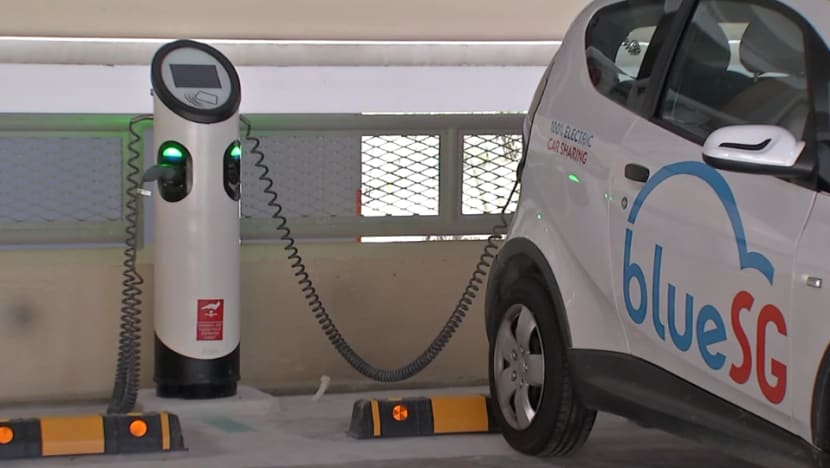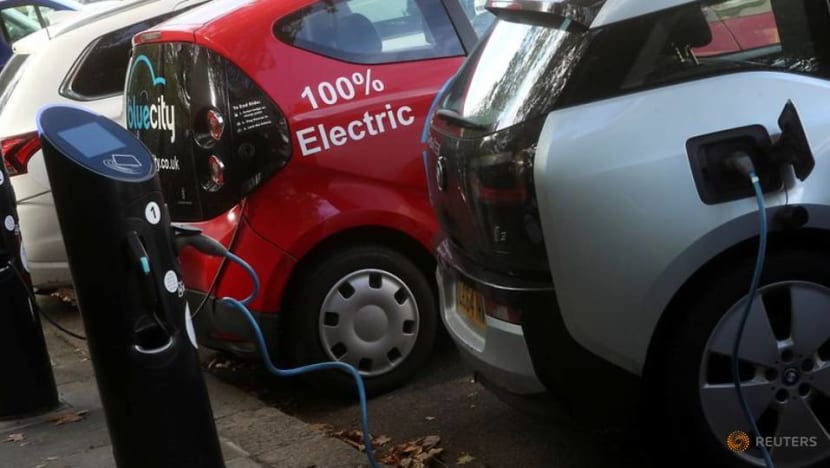Incentives likely to encourage electric vehicle adoption in Singapore, but questions remain, say analysts

A BlueSG electric vehicle charging point.
SINGAPORE: Newly announced measures aimed at incentivising the use of electric vehicles (EVs) are likely to encourage their adoption, say observers, though there are still questions about their implementation.
In his Budget 2020 speech, Deputy Prime Minister Heng Swee Keat announced that Singapore aimed to phase out the use of internal combustion engine (ICE) vehicles here by 2040, and outlined a slew of measures aimed at incentivising the use of more environmentally friendly alternatives, such as EVs.
Among them is the EV Early Adoption Incentive (EEAI), where those who buy fully electric cars and taxis will receive a rebate of up to 45 per cent on the Addition Registration Fee (ARF), capped at S$20,000.
READ: Budget 2020: Additional incentives to encourage use of more environmentally friendly vehicles
Mr Heng, who is also the Finance Minister, also announced plans to expand Singapore’s charging infrastructure, from 1,600 charging points currently to 28,000 in the future.
He also said the road tax methodology for cars will be revised, leading to an “across-the-board” reduction in road tax for EVs and some hybrids.
He noted though that the greater adoption of EVs would lead to a significant reduction in fuel excise duties - which amount to about S$1 billion annually - and that a lump-sum tax would be imposed on the road tax schedule for EVs.
This may lead to a higher total road tax for some EV models, though Mr Heng said annual usage cost for EVs will still be about 9 per cent lower than ICE equivalents and that consumers are still likely to enjoy “substantial cost savings” because of the EEAI.
The Land Transport Authority said the revised electric car road tax schedule will include an additional flat component of S$700 per year - which will be phased in over three years beginning in 2021 - as well as the existing variable component tied to power rating, which will be revised to “better account for improvements in vehicular efficiency”.
Singapore's electric car population currently stands at 1,125, or just 0.18 per cent of the 631,266 cars on the road here.
READ: What is keeping electric cars from gaining greater acceptance in Singapore?
The new measures were welcomed by the taxi industry, where operators have been moving away from diesel vehicles to petrol-electric hybrids over the last two years.
Ms Tammy Tan, ComfortDelGro's group chief corporate communications officer, said the taxi giant has “always been a strong proponent of efficient and green technology”, pointing to its trial of four fully electric Hyundai taxis as well as the conversion of half its 10,700-strong fleet to hybrid models.
“With the additional incentives given by Government for fully electric vehicles, we will also evaluate if we should bring in more fully electric taxis,” she added.
Mr Neo Kian Hong, Group CEO of SMRT, the third largest taxi operator here, said: “With the EV Early Adoption Incentive, we will gradually introduce EVs into our taxi fleet and reduce our carbon footprint even more.”

A STEP FORWARD FOR ELECTRIC VEHICLE ADOPTION
Mr Peter Huang, who has driven a Hyundai Ioniq Electric for about two years, said the moves to phase out ICE vehicles and expand the charging network were "amazing commitments" by the authorities.
The 37-year-old musician however wanted to know if any concessions could be afforded to existing EV owners, who committed to buying cleaner vehicles even before such schemes were announced.
"Some of us hope to be able to engage with the Government about this," he said.
Electric Vehicle Association of Singapore (EVAS) vice-president Paul Welsford welcomed the measures as a step forward for the adoption of EVs here, though he noted it is too early to tell how these will influence car buyers.
He noted EVAS had been pushing for changes to the road tax regime, he said.
Under the existing scheme, which has been in place since 2008, more road tax is incurred by more powerful cars, resulting in EVs being charged more than their fossil fuel powered equivalents.
However, Singapore University of Social Sciences (SUSS) transport economist Walter Theseira noted the lump sum road tax means using an EV will be less economical for those who do not drive so often.
Still, as such vehicles tend to be more efficient than their petrol or diesel equivalents, and with electricity being cheaper than that of either fossil fuel, EV owners will be able to get more mileage for less money, he said.
“So that’s why overall, running costs (for an EV) will be lower," noted Assoc Prof Theseira, who heads the master of urban transport management programme at SUSS.
Mr Welsford noted the "lump sum tax" is an interim measure, which will only be in place until the introduction of the next generation Electronic Road Pricing, when a usage-based tax can be implemented.
However, even with the incentives, the switch over to EVs in Singapore is likely to be a gradual one for several reasons, said Assoc Prof Theseira.
Among them is that there is still not a wide enough variety of EVs to meet the demands of motorists, with most buyers looking out for sports utility vehicles or minivans instead of the “niche” models automakers offer now, he said.
Another consideration is that Singaporeans who regularly drive up to Malaysia may also find it difficult to charge their cars across the Causeway, he said.
The finer details of where charging points are located and how quickly a car can be charged also needs to be worked out to ensure a network of 28,000 can meet the demand from motorists, said Associate Professor Theseira.
“I would not personally expect much transition to EVs, except maybe among some landed property owners, for the next few years.”
READ: Commentary: Where are all the electric vehicle charging points?
Mr Welsford however said more motorists here are likely to choose EVs in the coming years, even without Tuesday’s Budget announcements.
With the price of batteries coming down, the cost of such vehicles are set to be on par with petrol or diesel-driven ones, he said.
“More people would choose EVs as the more economical choice, rather than just (an environmentally) sustainable one.”
Assoc Prof Theseira noted that encouraging the use of public transport is more environmentally friendly than the use of privately owned vehicles, echoing comments made by Environment and Water Resources Minister Masagos Zulkifli in response to criticism of Singapore's EV policies by Tesla CEO Elon Musk last year.
“But that being said, motor cars are not going to go away,” he said. “And so given that you will have a certain number of these vehicles, they might as well be more efficient.”














